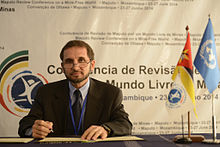Mired bin Ra'ad
| Prince Mired bin Ra'ad of Jordan | |
|---|---|
| Prince Mired Bin Ra'ad Bin Zeid Al-Hussein | |
 Prince Mired Bin Ra'ad Bin Zeid Al-Hussein of Jordan signing the Maputo Declaration for a Mine-Free World in 2014. | |
| Born | 11 June 1965 Amman, Jordan |
| Spouse | Dina Mohammad Khalifeh |
| Issue | Princess Shirin Prince Rakan Prince Jafar |
| Dynasty | Hashemite |
| Father | Prince Ra'ad bin Zeid |
| Mother | Majda Ra'ad |
| Religion | Sunni Islam |
HRH Prince Mired Bin Ra'ad Bin Zeid (Arabic: الامير : مرعد بن رعد بن زيد ) is the second son of Ra'ad bin Zeid, head of the royal houses of Iraq and Syria.
Early life
Mired bin Ra'ad (born June 11, 1965), is the second son of Prince Ra'ad bin Zeid, Lord Chamberlain of Jordan, and his Swedish-born wife Margaretha Inga Elisabeth Lind, subsequently.
Education
Ra'ad studied at Reed's School in England and at the Hun School of Princeton, New Jersey, graduating in 1983.[citation needed] He then graduated from Tufts University, Medford, Massachusetts, in 1987.[citation needed] He graduated from the University of Cambridge with a masters in philosophy and historical studies in 1988.[citation needed] He attended to Royal Military Academy Sandhurst and graduated in 1990.[citation needed] He then returned to Tufts University and studied at The Fletcher School of Law and Diplomacy and graduated in 1995.[1]
Career
A Royal Decree issued on April 21, 2014, appointed Prince Mired as Head of the Higher Council for the Affairs of Persons with Disabilities (succeeding Prince Ra'ad bin Zaid Chief Chamberlain). As such, he has publicly addressed Jordan’s obligations towards persons with disabilities[2] according to its obligations under the Convention on the Rights of Persons with Disabilities. He is also Chairman of the National Commission for Demining and Rehabilitation of Jordan.[3] As Head of the Hashemite military patients, he also served as Vice President of the Supreme Council for the Affairs of Disabled Persons.[4]
In 2008, Prince Mired presided over the Eighth Meeting of the States Parties[5] to the Convention on the Prohibition of the Use, Stockpiling, Production and Transfer of Anti-Personnel Mines and on Their Destruction, or Ottawa Treaty, which took place in the Dead Sea. Prince Mired has continued his work against landmines, as Special Envoy of the Convention promoting a universal ban of these weapons around the world. Among other countries, he has visited Laos and the United States (2010),[6] China (2013),[7] South Korea (2011),[8] and Myanmar (2018)[9] to promote the international treaty.
Personal life
In 1992, Mired bin Ra'ad married Dina Mohammad Khalifeh (later title, Princess Dina Mired) with whom they have three children, Princess Shirin bint Mired, Prince Rakan bin Mired and Prince Jafar bin Mired.[10]
Princess Dina Mired is a former Director General of the King Hussein Cancer Foundation, and continues to be actively engaged in efforts in the field of cancer control in the developing world.[11][12]
Mired's older brother, Prince Zeid, is the current United Nations High Commissioner for Human Rights, having taken up this post in September 2014.
Ancestry
| Ancestors of Mired bin Ra'ad | ||||||||||||||||||||||||||||||||||||||||||||||||||||||||||||||||||||||||||||||||||||||||||||||||||||||||||||||||||||||||||||||||||||||||||||||||||||||||||||||||||||||||||||||||||||||||||||||||||||||||||||||||||||||||||||||||||||||||||||||||||||||||||||||||||||||||||||||||||||||||||||||||||||||||||||||||||||||||||||||||||||||||||||||||||||||||||||||||||||||||||||||||||||||||||||||||||||||||||||||||||||||||||||||||||||||||||||||||||||||||||||||||||||||||||||||||||||||||||||||||||||||||||||||||||||||||||||||||||||||||||||||||||||||||||||||||||||||||||||||||||||||||||||||||||||||||||||||||
|---|---|---|---|---|---|---|---|---|---|---|---|---|---|---|---|---|---|---|---|---|---|---|---|---|---|---|---|---|---|---|---|---|---|---|---|---|---|---|---|---|---|---|---|---|---|---|---|---|---|---|---|---|---|---|---|---|---|---|---|---|---|---|---|---|---|---|---|---|---|---|---|---|---|---|---|---|---|---|---|---|---|---|---|---|---|---|---|---|---|---|---|---|---|---|---|---|---|---|---|---|---|---|---|---|---|---|---|---|---|---|---|---|---|---|---|---|---|---|---|---|---|---|---|---|---|---|---|---|---|---|---|---|---|---|---|---|---|---|---|---|---|---|---|---|---|---|---|---|---|---|---|---|---|---|---|---|---|---|---|---|---|---|---|---|---|---|---|---|---|---|---|---|---|---|---|---|---|---|---|---|---|---|---|---|---|---|---|---|---|---|---|---|---|---|---|---|---|---|---|---|---|---|---|---|---|---|---|---|---|---|---|---|---|---|---|---|---|---|---|---|---|---|---|---|---|---|---|---|---|---|---|---|---|---|---|---|---|---|---|---|---|---|---|---|---|---|---|---|---|---|---|---|---|---|---|---|---|---|---|---|---|---|---|---|---|---|---|---|---|---|---|---|---|---|---|---|---|---|---|---|---|---|---|---|---|---|---|---|---|---|---|---|---|---|---|---|---|---|---|---|---|---|---|---|---|---|---|---|---|---|---|---|---|---|---|---|---|---|---|---|---|---|---|---|---|---|---|---|---|---|---|---|---|---|---|---|---|---|---|---|---|---|---|---|---|---|---|---|---|---|---|---|---|---|---|---|---|---|---|---|---|---|---|---|---|---|---|---|---|---|---|---|---|---|---|---|---|---|---|---|---|---|---|---|---|---|---|---|---|---|---|---|---|---|---|---|---|---|---|---|---|---|---|---|---|---|---|---|---|---|---|---|---|---|---|---|---|---|---|---|---|---|---|---|---|---|---|---|---|---|---|---|---|---|---|---|---|---|---|---|---|---|---|---|---|---|---|---|---|---|---|---|---|---|---|---|---|---|---|---|---|---|---|---|---|---|---|---|---|---|---|---|---|---|---|---|---|---|---|---|---|---|---|---|---|---|---|---|---|---|---|---|---|---|---|---|---|---|---|---|---|---|---|---|---|---|---|---|---|---|---|---|---|---|---|---|---|---|---|---|---|---|---|---|---|---|---|---|---|---|---|---|---|---|---|---|---|---|---|---|---|---|---|---|---|---|---|---|---|---|---|---|---|---|---|---|---|---|---|---|---|---|---|---|---|---|---|---|---|---|---|---|---|---|---|---|---|---|---|---|---|---|---|---|---|---|---|---|---|---|---|---|
| ||||||||||||||||||||||||||||||||||||||||||||||||||||||||||||||||||||||||||||||||||||||||||||||||||||||||||||||||||||||||||||||||||||||||||||||||||||||||||||||||||||||||||||||||||||||||||||||||||||||||||||||||||||||||||||||||||||||||||||||||||||||||||||||||||||||||||||||||||||||||||||||||||||||||||||||||||||||||||||||||||||||||||||||||||||||||||||||||||||||||||||||||||||||||||||||||||||||||||||||||||||||||||||||||||||||||||||||||||||||||||||||||||||||||||||||||||||||||||||||||||||||||||||||||||||||||||||||||||||||||||||||||||||||||||||||||||||||||||||||||||||||||||||||||||||||||||||||||
References
- ^ http://www.apminebanconvention.org/fileadmin/APMBC/MSP/8MSP/day1/8MSP-Item2-18Nov2007-HisRH-Bio-en.pdf
- ^ "Jordan's obligations towards persons with disabilities". Jordan Times. 16 August 2014. Retrieved 6 February 2017.
{{cite web}}: Cite has empty unknown parameter:|dead-url=(help) - ^ "National Committee for Demining and Rehabilitation". Retrieved 6 February 2017.
{{cite web}}: Cite has empty unknown parameter:|dead-url=(help) - ^ "Yarmouk launches project to improve electronic services for people with disabilities university". 4 April 2016. Retrieved 6 February 2017.
{{cite web}}: Cite has empty unknown parameter:|dead-url=(help) - ^ "AP Mine Ban Convention: What was the 8MSP and why was it important?". www.apminebanconvention.org. Retrieved 2017-02-06.
- ^ "Princely task: tell leaders landmines not part of military might". Geneva Lunch News. Retrieved 6 February 2017.
{{cite web}}:|archive-date=requires|archive-url=(help); Cite has empty unknown parameter:|dead-url=(help) - ^ "Anti-Personnel Mine Ban Convention's Special Envoy asks China to join the anti-landmines movement". www.apminebanconvention.org. Retrieved 2017-02-06.
{{cite web}}: Cite has empty unknown parameter:|dead-url=(help) - ^ "Koreas could build trust by jointly removing mines: special envoy". Yonhap News. 4 April 2011. Retrieved 6 February 2017.
{{cite web}}: Cite has empty unknown parameter:|dead-url=(help) - ^ "AP Mine Ban Convention: Landmine treaty Special Envoy concludes official visit calling on Myanmar to take concrete steps towards accession". www.apminebanconvention.org. Retrieved 2018-06-05.
- ^ "Princess Dina Mired, Director General, King Hussein Cancer Foundation". The Huffington Post. Retrieved 6 February 2017.
{{cite web}}: Cite has empty unknown parameter:|dead-url=(help) - ^ "World Cancer Day event at the IAEA". International Atomic Energy Agency. Retrieved 7 February 2017.
{{cite web}}: Cite has empty unknown parameter:|dead-url=(help) - ^ "World Cancer Day 2017: Key Panellists Share their Experience". International Atomic Energy Agency. Retrieved 7 February 2017.
{{cite web}}: Cite has empty unknown parameter:|dead-url=(help)

